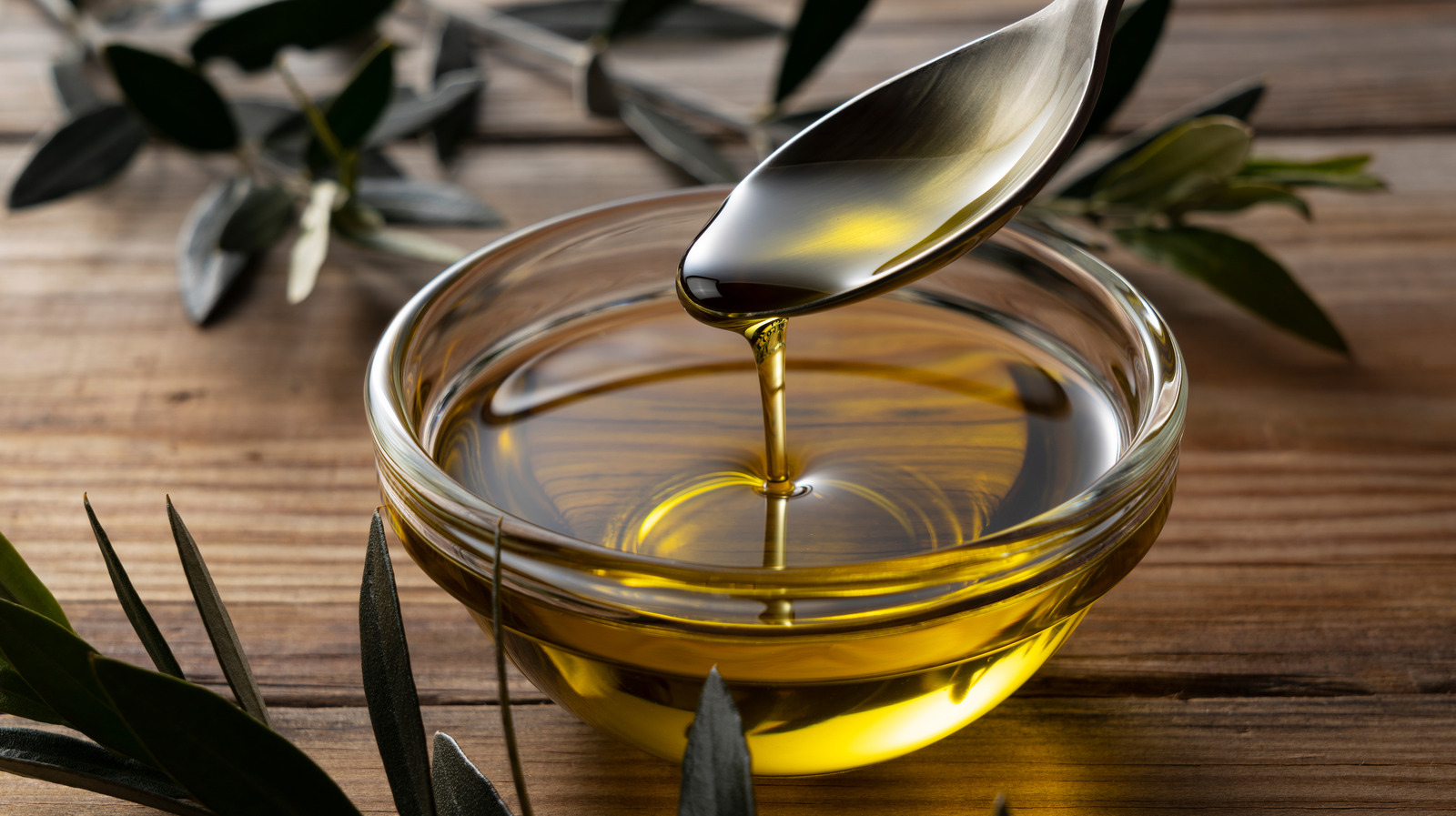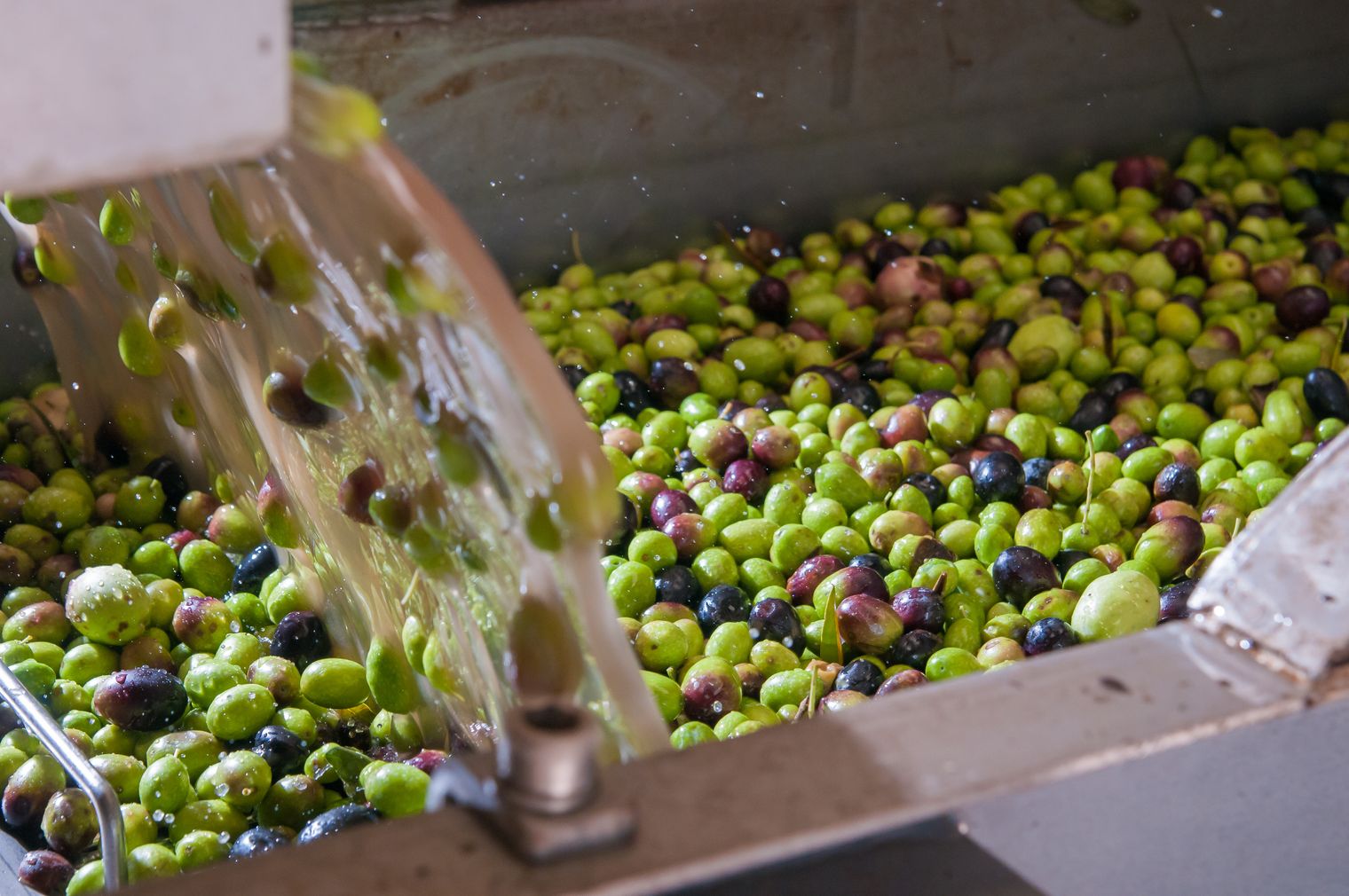.jpg?width=4860&name=kale olive oil (Large).jpg)
Olive Oil and the Sirtfood Diet
Extra virgin olive oil will crystallize and/or solidify at a wide variety of time and temperature exposures. All this variance is what makes extra virgin olive oil truly special. Forget the fridge, and focus instead on enjoying the wide variety of flavors found amongst extra virgin olive oils .

Can olive oil go off? How to tell & what to do about it Brit Buyer
As the temperature decreases, they begin to separate out, making the oil cloudy. (For olive oil, this separation occurs at 43 degrees.) Returned to room temperature, the polyphenols will dissolve once again and the oil will look normal. Even so, olive oil takes a few hours to "melt" back into its liquid form once it has been refrigerated.
[Solved] Sometimes, olive oil will solidify at refrigerator
5. As revealed later, first check, if it is temperature dependent temporary solidification. It is natural and reversible process, the same process as when melted fat solidifies back when cooled down. Prevention is to keep oil warm enough and the cure is warming it up until it melts. Every fat has its typical melting point ( or range).

Pin on SFM Design Studio
However, we would like to take some time to talk about how extra virgin olive oil behaves when exposed to cold. When extra virgin olive oil reaches 55 degrees, it will typically begin to cloud. At 50 degrees most olive oils really begin to set up, at 45 degrees it can become a gel, and any colder, it can look like a solid block. This doesn't.

Demystifying the Different Grades of Olive Oil Cobram Estate USA
Does Olive Oil Freeze? Exploring at What Point Olive Oil Freeze. Key Takeaways. Olive oil has a freezing factor around 37°F (2.78°C). But, it can start to solidify at temperatures as high as fifty four°F (12.22°C). Olive oil may be stored in the fridge, however it'll solidify. This isn't dangerous to the oil and could now not have an.

Difference Between Olive Oil And Vegetable Oil
World's Best Olive Oils for 2024 to Be Revealed The Rise of Cycling in Italian Olive Groves All olive oils contain a small amount of saturated fatty acids that solidify at refrigerator temperatures, Contrary to popular myth, whether an olive oil solidifies or not at refrigerator temperatures is no indi.

Olive Oil Benefits For Skin, Hairs and Health The Post City
All olive oils contain a small amount of saturated fatty acids that solidify at refrigerator temperatures, Contrary to popular myth, whether an olive oil solidifies or not at refrigerator temperatures.

Does Olive Oil Solidify? Brightland.co
Unlike water, which has a consistent freezing point of 0°C (32°F), the freezing point of olive oil is not fixed. It generally begins to solidify at around -6°C (21°F), but this can vary based on its type and the specific fatty acids it contains. Olive oil will begin to get cloudy and thicken as it approaches its freezing point.

Does Olive Oil Solidify? Brightland.co
When real olive oil is exposed to low temperatures, it can indeed solidify. This is because olive oil contains a high percentage of monounsaturated fats, which have a higher freezing point than other types of fats. When the temperature drops, the fats in the olive oil start to solidify, resulting in a cloudy or semi-solid texture.

How To Prevent Your Oil From Solidifying In The Cold Carhampt
Olive oils solidify when they reach the cloud point (ca. 40°F or 5°C). Waxes and fatty acids congeal, making the oil solidified. Some olive oils naturally solidify quicker than others. If the olive oil solidifies, it may be a sign that it's a good oil, but other things should be checked as well. Table of Contents hide.

Olive oil treatment, Olive oil facial, Skin care system
Table of Contents hide. Olive Oil Usually Gets Cloudy in Temperatures Below 40F (5C). Few Things You Can Do To Liquify The Olive Oil Again. 1. Keep The Bottle on The Counter. 2. Immerse The Bottle In Hot or Warm Water. 3. Microwave The Bottle For a Few Seconds.

How to Stop Olive Oil Solidifying in the Fridge 8 Easy Ways (2023)
It's important to note that the solidification of olive oil does not affect its quality or taste. Frequently Asked Questions About Olive Oil Solidification 1. Why does olive oil solidify in the refrigerator? When olive oil is exposed to cold temperatures, the monounsaturated fats in the oil begin to crystallize, causing it to solidify.

The Different Types of Olive Oil And What They’re Good For! The
Olive oil can be cloudy for several reasons. First, when your olive is stored in cold temperatures, it can begin to solidify. This usually happens when it's stored in refrigerators or during the winter months. Additionally, olive oil can be cloudy when it is unfiltered. Cloudy olive oil doesn't necessarily mean that it shouldn't be used.

Do You Lose Any Health Benefits When You Heat Olive Oil?
Yes, it is normal for olive oil to solidify in the refrigerator. The solidification is a natural process that occurs due to the presence of monounsaturated fats in the oil. Once the oil returns to room temperature, it will become liquid again, and you can continue to use it as you normally would.

Is This the Fountain of Youth? Studies Reveal Olive Oil Promotes a
Most high-quality olive oils begin to become cloudy at temperatures of 50 degrees; at about 45 degrees, they can turn into a gel, and at any lower temperature, they can solidify into a hard block. It is a result of the naturally present waxes in the olive fruit and its pit that react to the lowered temperatures.

How is Olive Oil Made?
The freezing temperature is still disputed, but is estimated to be between 35-40° F. At about 40-50°F, the olive oil can begin to solidify, making it look cloudy or crystalized. As the olive oil gets colder, it turns into the consistency of room temperature butter.. Chilling or freezing olive oil does no harm and the oil will return to its.